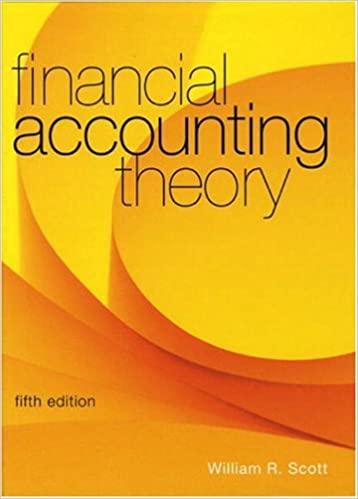The article here reproduced from The New York Times (October 12, 1997) describes pressures to kill the
Question:
The article here reproduced from The New York Times (October 12, 1997) describes pressures to “kill” the FASB, and hand its duties over to the SEC. The reason for the pressure seems to be due to SFAS 133 (see Sections7.
3.4 and7.
3.5), which requires firms to fair value derivative instruments.
Politicians Threaten Accounting Integrity Sixty years ago, an intense battle was waged inside the young Securities and Exchange Commission. There was no consensus about how to fix what all agreed was the deplorable accounting that was showing up in corporate financial reports.
On one side was the commission's new chairman, William O. Douglas, who thought the commission should promulgate its own standards. On the other was the S.E.C.'s chief accountant, Carman C. Blough, who thought the Government could not do a good job and wanted it left to the private sector, with S.E.C. oversight. On a 3-2 vote of the commission in 1938, Douglas lost.
Blough then persuaded the American Institute of Certified Public Accountants that it needed to get moving. After hearing Blough give a harsh speech noting more than 30 questionable accounting practices that had been approved by accountants, the institute set up a Committee on Accounting Procedure to make rules. That body was replaced by the Accounting Principles Board in 1959 and by the Financial Accounting Standards Board in 1973, as the rule makers gained more power and independence.
The arrangements have sometimes been cumbersome and slow. It has been more than a decade since the board took up the question of accounting for derivatives, and only now is it poised to issue a rule. But the process has produced the best accounting anywhere and helped to make New York the financial capital of the world. It would be hard for the S.E.C. to match the detailed expertise of the FA.S.B. and its staff.
Nonetheless, a campaign is on to kill the FA.S.B. The banks are furious over the new derivatives rule, which would force users of derivatives to record the market value of those instruments in their financial reports. The banks say the rule will confuse investors and scare off some companies that would benefit from using derivatives. They have lobbied hard in Congress, and both the House and Senate have held hearings to bash the F.A.S.B.
on the issue. Last week, John Reed, the chairman of Citicorp, called for abolishing the F.A.S.B. and transferring its duties to the S.E.C.
Mr. Reed's suggestion, as it happened, was published in a letter to the editor of the Wall Street Journal on the same day that the Senate killed campaign finance reform. The sad reality today is that injecting politics into accounting carries with it a real risk regarding accounting integrity. It is not hard to imagine a future S.E.C. budget being held up by a Congressman, or confirmation of a future S.E.C. chairman delayed by a senator, amid quiet negotiations regarding the need to change an accounting rule that threatens quite unfairly, of course—to penalize the profits, and perhaps hurt investors and employees, of a company that has been a substantial supporter of the legislator.
The F.A.S.B.'s new derivatives rule is not perfect, but it is an improvement over current practice. If need be, it can be changed later. But the wisdom of that rule is much less important than the preservation of a process that has worked well without a hint of impropriety. If the politicians succeed in killing this rule, as they did with an earlier proposal to change accounting for employee stock options, it is hard to see how the F.A.S.B. will survive. And that would pose a real threat to continued investor confidence.
It is time for businesses, even those that don't like the derivatives proposal, to tell the politicians to leave accounting alone.

Required
a. Use the interest group theory of regulation to explain the reasons for the campaign to kill the FASB. Why would certain bank executives prefer accounting standards to be set by the SEC?
b. Use the public interest theory of regulation to evaluate the costs and benefits of moving financial accounting standard setting to the SEC. Include in your answer an evaluation of the structure of the FASB. Also consider the effects of such a move on investor confidence in capital markets.
Step by Step Answer:






